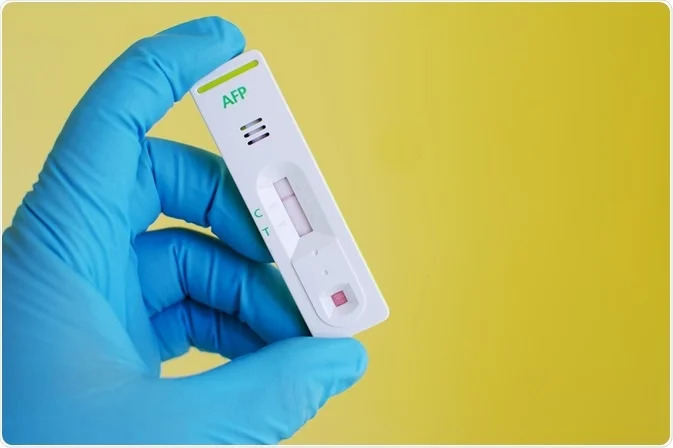Preventive Healthcare
Alpha-Fetoprotein Test: Procedure, Normal Range, Levels, Cost & Results

Table of Contents
Alpha-Fetoprotein (AFP) test is a prenatal test performed to determine the risk of a baby developing certain genetic disorders. This test screens for conditions such as Down’s syndrome or neural tube defects. However, it cannot diagnose any health conditions that are independent of genetic abnormalities. If your AFP test results are abnormal during pregnancy, your physician may advise a more thorough test panel to find out whether your baby has a health problem or not.
Apart from pregnancy, the AFP test is also routinely carried out to diagnose certain cancers in adults. In this situation, the test is more accurately referred to as the “AFP tumour marker test.”
What is an AFP test?
AFP refers to Alpha-Fetoprotein. This protein is typically produced in the liver of a still-developing baby present in the mother’s womb. It is also produced by the yolk sac that covers the baby in the womb and its gastrointestinal tract. When the baby takes birth, the AFP levels are high, but they normalize to much lower levels as they complete the 1-year milestone. Therefore, higher levels detected in an adult are attributed to abnormal conditions like cancer.
Because there is a constant exchange of materials between the mother and child during pregnancy through the placenta, the AFP levels detected in the mother’s blood are a reliable measure of those in the baby.
What is The AFP Test Used For?
The AFP test is performed during pregnancy as a part of a quad screening test performed before birth. It is performed between 15 and 20 weeks of pregnancy and assesses the risk of the baby developing the following conditions:
· A neural tube defect can be detrimental to the development of a baby’s brain or spine.
· Down’s syndrome, which is a genetic disorder that can cause intellectual disabilities along with other health problems.
· Edward’s syndrome, which is a very severe genetic disorder that affects the child’s development.
· Other chromosomal abnormalities.
If the AFP test is used for marking tumours, it can be used to:
· Validate a case of liver or ovarian cancer or testicular cancer.
· Monitor the effectiveness of a particular cancer treatment, and detect if the cancer is metastasizing (spreading) or not.
· Check for recurrence of cancer.
· Monitor conditions of the liver such as hepatitis or cirrhosis.
AFP tumour marker test is also widely used to idealise a treatment method for people detected with liver cancer. This helps physicians determine the best treatment method – be it targeted therapy or chemotherapy to achieve the best possible outcomes.
Why Do I Need an AFP Test?
Contrary to popular belief, an AFP test is not a mandatory part of prenatal screening. However, it is considered a safer alternative to test for it. Your physician may especially recommend an AFP test during pregnancy if you:
· Have a family history of birth defects or complicated pregnancies
· Are 35 years and older during conception
· Have diabetes or a family history of diabetes
· Have been exposed to certain drugs or medicines during pregnancy which could potentially cause birth defects
What Happens During an AFP Test?
The AFP test is a part of routine blood screening during pregnancy. The technician will collect your blood sample and process it further. Therefore, there are no specific risks involved with getting an AFP test done nor is there any particular preparation required from your side. AFP blood tests do not require you to fast unless suggested by your physician.
What Do the AFP Test Results Mean?
The normal range for the AFP test differs by large depending on how advanced the pregnancy is when the mother is being tested. Between week 15 and week 20 of pregnancy, the levels of AFP in the blood should ideally range between 10 ng/mL to 150 ng/mL. If the pregnancy has advanced, this range can fluctuate.
- AFP lower than this range may suggest the presence of Down’s syndrome
- AFP higher than this range may suggest conditions such as spina bifida (a condition where the baby’s spine does not close around the spinal cord), or anencephaly (a condition where the brain does not develop fully)
For women who are not pregnant and for men, the normal range of AFP tests should be less than 10 ng/mL. Any unusual increase in this can suggest liver-related conditions or cancer.
What Happens if My AFP Results are Beyond The Normal Range?
An AFP test is indicative, not diagnostic. If your AFP test results are abnormal, the doctor will perform a series of confirmatory tests such as an ultrasound to confirm the diagnosis. As per the American Pregnancy Association, the AFP test results are abnormal for at least 25 to 50 women out of every 1000 tested. Only 1 in 16 women with abnormal test results have a baby with a birth defect. Therefore, in case your AFP test results do turn out abnormal, wait for a diagnosis from your physician.
What is The Cost of an AFP Test?
Commonly, the AFP test is not performed individually. It is combined with other diagnostic tests that make up a triple or quad screening panel that detects genetic abnormalities. At Metropolis, the AFP test costs around Rs 3000 as a part of the triple marker screening test. The AFP test price can vary depending on the services provided and the centres. With Metropolis, you can also opt for a home visit for blood collection where our experts come to you easily and conveniently to collect the samples.
Metropolis has a team of over 200 senior pathologists, ensuring accurate and quick results for over 4000+ tests that are used for early detection, screening, prediction, and diagnostics. If you are planning to get an AFP test, reach out to us at Metropolis today!























